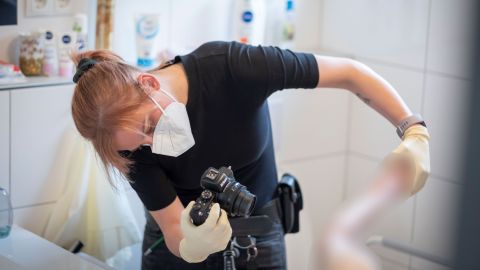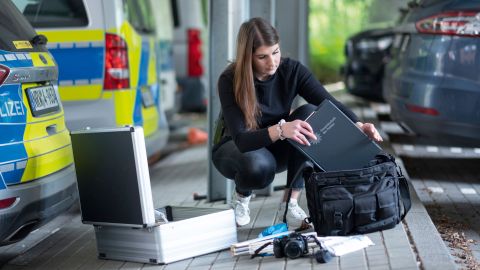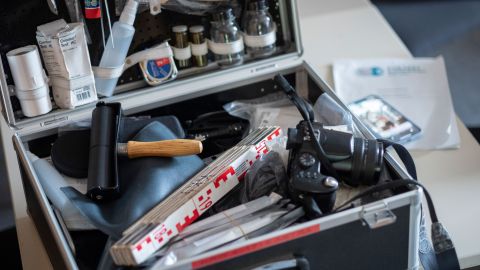Everyone probably knows this parking lot in front of the Dortmund police station from "Tatort". Didn't Inspector Faber just heave himself out of the official car? Disheveled and grumpy as usual? And this scene there in the entrance area looks like something out of a Sunday thriller. An elderly woman lies unconscious on the floor. A policeman is tending to her. Paramedics rush over. Chief Superintendent Chantal Boller has already completed three hours of her weekend early shift at the K station. It's going to be a "busy day".
Boller, one of three K-Wache teams, has been on duty since 5.30 a.m. on this Saturday morning. There has been a fire in a housing project for mentally ill people in the Marten district, a sexual offense in Hörde, break-ins at a school and various cars and, last but not least, a request from colleagues in Lingen, Lower Saxony, asking if a team could assist with the search of two apartments in Dortmund.
Chantal Boller (28) is sitting in one of the five writing rooms on the first floor of the police station. Above her is a large photo of a typical New York street scene. In front of her are two computer screens. She has just returned from securing evidence in Hörde. The victim of the sexual offense is a mentally ill woman from the LWL clinic in Aplerbeck, who was out drinking with two men. A witness had observed the scene and alerted the police. The young investigator has since seized the victim's clothing and taken it to the evidence room for examination.
One room further on, her team partner Tim Dzikowski is supporting the investigation into the fire in Marten. It's a case of arson. A resident of the house, still in her pyjama bottoms and slippers, shuffles across the corridor. She is said to know the suspect and is being questioned.
Even as a child, Chantal Boller was fascinated by crime stories. "When I was eight or nine years old, I went to the police in my home town of Meinerzhagen and asked if I could do an internship. The officers told me to come back in a week. But when I turned up again, they just laughed ...", the detective recalls with amusement.
In the end, Boller ended up working for the police and studied for three years at the University of Applied Sciences for Police and Public Administration in Hagen. Now, after six years as an investigator, she teaches criminalistics and forensics there as a part-time lecturer. A stellar career.
"Chantal! A body in Aplerbeck!" shouts Alina D., the guard on duty from the "small control center" opposite. She is in contact with all the patrol cars in the city and deploys the teams. She knows what the situation is on the ground, which K-station team is dealing with what and where. "Right now?" asks Boller. - "No, we're waiting for the request from the patrol car!"
Dortmund and its now infamous Nordstadt district. Multiculturalism around Borsigplatz. It's a charming neighborhood, but not without its dangers. Nordstadt is a crime hotspot - street crime, criminal clan members and right-wing groups dominate police operations. "Dortmund has changed," says Chantal Boller. "There are hardly any simple assaults any more. It feels like every crime involves a knife."
A situation that has an impact on the police officers' sense of security. "We wear stab-proof and bulletproof vests. And you look carefully at who you're dealing with," says the 28-year-old. More than ever after the incident in Ratingen. "I got goosebumps when I heard that. My thoughts were with my colleagues, but the thought also crossed my mind: It could happen to us here too."
"Chantal! The dead woman in Aplerbeck!" shouts Alina D., signaling that Chantal Boller is now expected there. An emergency doctor had been called to the apartment of a 91-year-old woman. The doctor does not know the circumstances and routinely calls in the police.
Boller and her colleague Tim Dzikowski had an idea of what to expect. The woman had collapsed in the bathroom on her way to the toilet, says the deceased's daughter, who opens the door to the elegantly furnished apartment in the south of Dortmund. A short time later, Chantal Boller bends over the dead woman, cuts open her nightgown - protecting herself from infection with an FFP2 mask and gloves. She feels the woman, looks for possible defensive wounds, takes photos of the dead woman. Her colleague next door takes the daughter's statement. "Everything fits," says Chantal Boller later, as she disinfects her utensils. "There is apparently no evidence on her body that anyone caused her death."
The mortician rings the bell. Chantal Boller closes her body bag. There's nothing more to do here. Back to the police station!
An hour and a half's drive away in Detmold in East Westphalia, Detective Inspector Olivia Habermann has long since finished her night shift. Detmold is a small town of 75,000 inhabitants with universities and authorities. Even the Detmold police station on the main street next to the district building, a cozy 80s brick building, gives the impression that everything is still in order here.
Which is not to say that Olivia Habermann has a quiet job here. On the contrary. Night shift at her K station means that she and the team are solely responsible for everything that requires forensic expertise. And this night shift is a tough one. Shortly after the shift begins, the Guardia Civil from Spain calls in because they need information about a man from Detmold who they have arrested on suspicion of forging documents. In fact, the man is also what is known as "sufficiently well-known" in his home country.
Olivia Habermann is 24 years young. She too has wanted to be an investigator for as long as she can remember. She "needs the adventure". And she likes shift work: "Especially when it's turbulent."
Shortly after midnight, Olivia Habermann and her colleague Schmid set off for the Teutoburg Forest! Someone has discovered a dead body near the Externsteine, a popular excursion destination in Lippe. The cause of death is unknown and the location is difficult to make out in the dark. "We are lucky that the patrol cars and radios are now equipped with GPS and can be identified by the control center. Otherwise we could have spent a long time searching in the depths of the Teutoburg Forest," says the investigator.
The pieces of the puzzle soon fit together. The man, who comes from Lower Saxony, committed suicide. He had apparently not been missed by anyone at home. In Detmold, however, his motorcycle had been noticed days ago, parked somewhere as if forgotten.
Black jeans, black sweater, badge casually attached to a snap hook. Olivia Habermann switched to the CID after a year on patrol duty. There are still assignments that she is experiencing for the first time and has to get to grips with. "It's difficult when children become victims," says Habermann. "Of course, traumatic experiences are also part of our job, but I've found a way to deal with them well and not take the professional issues home with me after work. It also helps, for example, to talk to colleagues from the team about what I've experienced." She emphasizes: "First and foremost, our Lippe K-Wache is about searching for and securing evidence - but of course we are also responsible for corpses."
Two K-stations. Two detectives. One passion. On the way home, Olivia Habermann will listen to a podcast, as she often does. Crime, of course. To relax, as she says. And Chantal Boller enthuses about the fascination of her work: "Patrol duty brings us every new case like a package. We unpack it, take it apart and find out how it all fits together."






